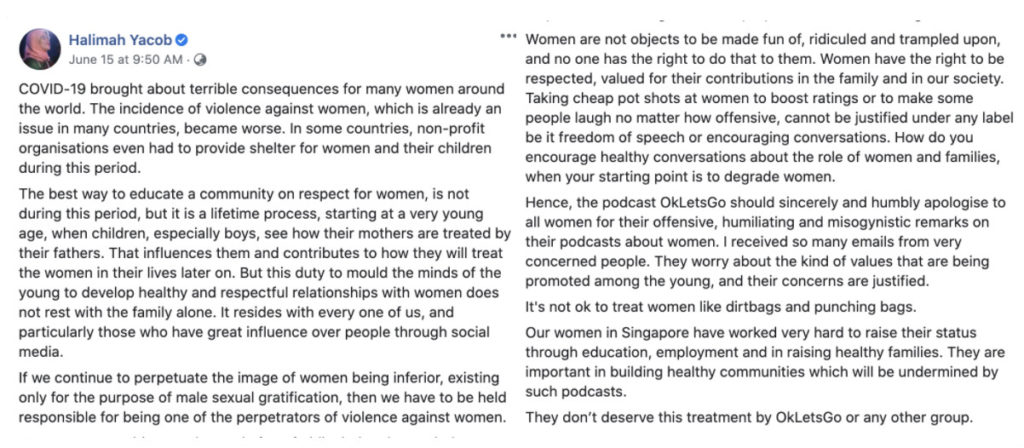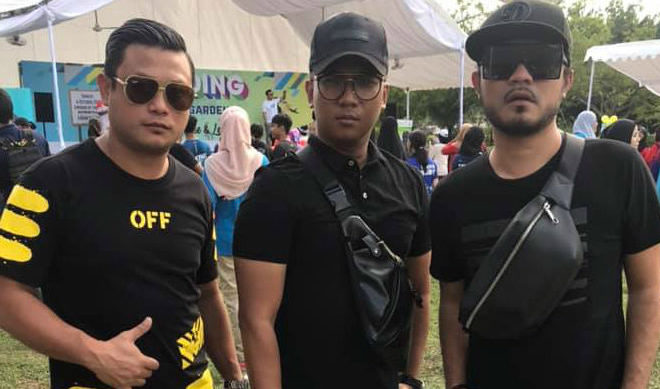Barely a fortnight ago, I posted a Tweet that went viral. I wanted to express my discomfort over the casually sexist banter of a certain local podcast. It was done because, the way the men of that podcast banter, reminded me too much of the experiences I have had almost daily, involving casual sexism.

It is normal for my sister and I to be catcalled by older Malay men while on our way to get groceries. It is normal for male colleagues to talk about a woman’s body in explicit detail, in my presence. It is normal for male relatives to lounge around during festivities while their female counterparts are hard at work. It is normal that I do not know a single woman in my life who have not had an encounter with sexual assault in some form.
So, I was not surprised when my Tweet received so much backlash from the Malay community, both men and women. It seemed perfectly natural for people to be offended because, what I am questioning and attacking, is after all, a normal way of life, isn’t it?
Singapore president orders podcast hosts to apologize to women
What didn’t surprise me as well, was the number of women, rallying together to amplify my sentiment, share their stories and experiences, and express their disdain over how the podcast hosts portray women.
Women are tired of being sexualized. We are tired of biting our tongues and giving strained smiles when sexualization gets passed off as fun and jokes.
The problem with sexualization is that, it reduces women to sex objects. Having that deeply ingrained and normalized, in turn, makes them easier targets for sexual assault. If it is alright for three men, backed by leaders of the Malay community no less, to describe a mother’s body in lurid detail, ogle openly at a transgender woman’s breasts, tell a couple of young women that they “like young girls,” pressure a rape victim to relive her experiences, and many other highly insulting scenarios, what kind of message does that send? When impressionable young men listen to this kind of talk, what kind of ideas and values are being subliminally incepted into their minds?
Many supporters of the podcast insisted that women were being oversensitive and overly critical in response. They claimed that we can just listen to something else or that we should remember the good that the podcast has done for our Malay community.
Okletsgo issues apology after President Halimah Yacob tells them off for ‘misogynistic’ remarks
Since the beginning, my friends and I have never disregarded the good the podcast has done. However, it does not give a pass for them to be sexist. In fact, it sends a dangerous message; women should forgive and overlook abuse and misogyny, as long as the offender has done enough charity.
I could not stand for it. Many others felt the same. Upon receiving such divided backlash, my friends and I decided to email the various organizations and ministers who have endorsed the podcast. We even emailed the president, considering, as a Malay woman herself, she must understand our sentiments.

President Halimah Yacob’s statement on Facebook was exactly what women needed at that point of time. Here was a woman in the highest office in our country, taking a clear stand against misogyny, even urging for an apology from the offending men! It was apparent that the president thought it was important for her to model the strength and resolve that our community needs to see in women, against misogyny.
When that statement was released, many rejoiced, but I was uneasy. Yes, it was a huge victory for women when we are represented by a president who validated our concerns and called for change. However, there were already people talking about moving on from this entire saga, after the men of the podcast apologized.
The president’s statement did not solve misogyny. Even as the statement was released, women are still being ridiculed for even raising the issue. There is still yet to be word from the podcast on what is it specifically they are apologizing for, and whom they are apologizing to.
People still do not understand that we do not have a personal vendetta against the podcast or any other media platforms that have portrayed themselves as sexist. We simply want the podcast to take accountability for their sexist and misogynistic words, and to educate their vocal supporters on where they went wrong. The conversation must continue.
There is a dire need for awareness and education, and it should come from the podcast since they have apologized. Our efforts in starting this conversation, in reaching out to the various organizations and individuals, the bravery of women coming forward with their stories and experiences, and the President’s statement, will all be in vain, if we just forgive and forget.
An apology is made up of both words and actions. I strongly believe, the podcast, whom many have lauded as a platform that brought a lot of awareness and good to the Malay community, should take open and concrete steps in improving their content.
They can start with addressing their followers, who still stand by how the podcast has done no wrong. Discuss the offending episodes and cite specifically which statements they have made on air that are misogynistic, and why. Assure the public that they are taking steps to improve, by taking courses on how casual sexism builds a culture that is unsafe for women.
The Malay community does need a no-holds-barred platform like theirs to address pressing issues. It can be done without the misogyny. I am positive that they can gain many more followers if they sincerely addressed and rectified their mistakes. I will be one of them if that happens.
Related:
Singapore president orders podcast hosts to apologize to women
Okletsgo issues apology after President Halimah Yacob tells them off for ‘misogynistic’ remarks




